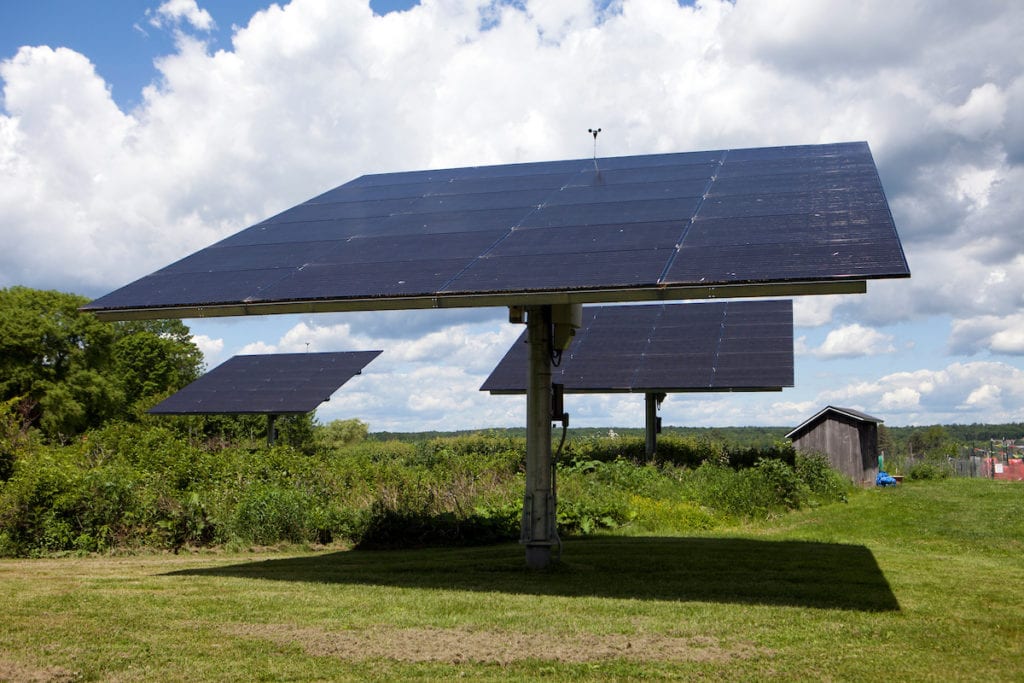
Maine Audubon is excited to begin work in the Maine Legislature supporting bills that will support investments in renewable energy and reduce climate change-causing emissions. On Tuesday, January 29 2019, Maine Audubon shared testimony in support of the first of those bills: LD 91, An Act to Eliminate Gross Metering. Maine Audubon advocated Eliza Donoghue was pleased to be joined by several citizens (from high schoolers to retirees!), solar installers, and faith leaders.
This bill would repeal a policy that has been largely viewed as regressive. Before 2018 Maine used what is called “net metering,” where a homeowner would get paid for whatever excess energy they generated and sent to the grid. However, last year Maine changed to a “gross metering” system, which charges ratepayers based on the total amount of energy generated whether or not that energy entered the grid, as measured by costly new meters. It quickly became apparent that gross metering was too expensive and not a good deal for Mainers. LD 91 seeks to revert to the successful net metering system.
We support LD 91 and other bills that encourage the further adoption of renewable energy. You can learn more about LD 91 and read Maine Audubon’s testimony below.
Stay in touch with us to learn how the Committee and the full Legislature votes on this important bill!
Maine Audubon Testimony in Support of LD 91, An Act to Eliminate Gross Metering
Public Hearing before the Committee on Energy, Utilities, and Technology
Tuesday, January 29, 2019
Thank you for the opportunity to offer testimony in support of LD 91, An Act to Eliminate Gross Metering, on behalf of Maine Audubon and our 30,000 members and supporters.
To protect wildlife and its habitat, Maine Audubon is committed to reducing the need for energy powered by fossil fuels, the largest contributor to climate change. Maine Audubon supports and promotes policies that facilitate production of clean and sustainable energy at the local, state, and federal level and at homeowner, business, and community scales. LD 91 is a such a policy.
LD 91 would compel the Maine Public Utilities Commission (PUC) to amend its rules to be substantially equivalent to the rules in effect on January 1, 2017, thus re-establishing Maine’s “net metering” policy. The rules currently in place require all electricity customers to pay for extra metering equipment at new solar projects. Those meters are used to measure the entire output of homeowners, businesses, or large scale solar installations and then charge a fee on that output, including power used on site and not sent to the grid–collectively referred to as “gross metering”.
In the first year of this rule, the cost of this extra metering equipment for large scale solar generation facilities far outweighed savings to customers–remember, the cost of this equipment is borne by all ratepayers. This finding, arrived at by solar installer InSource Renewables, was confirmed by the PUC, who has since exempted medium and large scale solar facilities from the gross metering rule.
LD 91 would do away with grossing metering all together and reinstate Maine’s net metering policy, in which extra metering equipment is not necessary because “credits” for solar customers are based solely on electricity their solar installation delivers to the grid (i.e. excess energy used in the home, business, etc.), which can be determined by a single meter. Not only does using a single meter save Maine ratepayers money, but there is considerable evidence that solar power reduces grid and power plant costs–and therefore rates–for all customers.
Climate change is one of the biggest threats to wildlife and habitat in our state, across the nation, and around the world. Increasingly, warmer and shorter winters affect many of our iconic species, such as moose, lynx, loons, and our state bird, the Black-capped Chickadee. Research from National Audubon has found that 314 bird species are likely to lose 50% of their range by 2080–including 50 birds in Maine–as a result of climate change. Warmer stream temperatures threaten Maine’s native brook trout and endangered Atlantic salmon, and sea level rise will erode our state’s coastal habitats, affecting endangered birds like the Piping Plover and Least Tern. LD 91 would remove a significant, unfair financial hurdle for investing in solar and thus is one way to address the devastating impacts that climate change is having on the wildlife that Maine people value.
